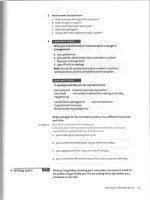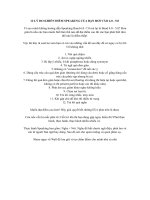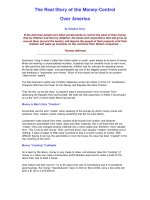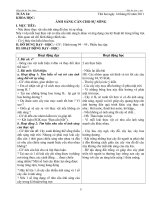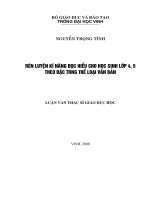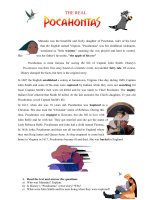4 5 5 life on mars the real story
Bạn đang xem bản rút gọn của tài liệu. Xem và tải ngay bản đầy đủ của tài liệu tại đây (3.54 MB, 12 trang )
Suggested levels for Guided Reading, DRA,™
Lexile,® and Reading Recovery™ are provided
in the Pearson Scott Foresman Leveling Guide.
LIFE ON MARS:
THE REAL STORY
by Johanna Biviano
illustrated by Eric Reese
Genre
Realistic
fiction
Comprehension
Skills and Strategy
• Draw Conclusions
• Graphic Sources
• Monitor and Fix Up
Scott Foresman Reading Street 4.5.5
ISBN 0-328-13486-4
ì<(sk$m)=bdeige< +^-Ä-U-Ä-U
Reader Response
LIFE ON MARS:
THE REAL STORY
1. What conclusion can you draw about how well
Lisa can talk to her parents and confide in them?
Be prepared to support your conclusion with
evidence from the story.
2. While you were reading, did you have any
questions? What did you do to answer your
by Johanna Biviano
questions?
illustrated by Eric Reese
3. On a separate sheet of paper, write down all of
the words that were new to you as you read. If
you think you can guess a word’s meaning from
the context, write down your guess. Look in the
dictionary to see if your guess is correct. Make sure
to write the correct meaning next to the word. Use
a graphic organizer like this to list your words and
definitions.
Word
Meaning from
Context
Meaning from
Dictionary
4. Lisa was afraid of Mars and Martians until she
started learning about Mars. How are you able
to get over your fears? Give an example of a fear
you had and tell how you learned to deal with it.
Editorial Offices: Glenview, Illinois • Parsippany, New Jersey • New York, New York
Sales Offices: Needham, Massachusetts • Duluth, Georgia • Glenview, Illinois
Coppell, Texas • Ontario, California • Mesa, Arizona
CONTENTS
CHAPTER 1
Blast Off to Mars! . . . . . . . . . . . . 4
CHAPTER 2
Being There . . . . . . . . . . . . . . . . . 9
CHAPTER 3
Every effort has been made to secure permission and provide appropriate credit for
photographic material. The publisher deeply regrets any omission and pledges to
correct errors called to its attention in subsequent editions.
How to Live in Space . . . . . . . . . 14
Unless otherwise acknowledged, all photographs are the property of Scott Foresman,
a division of Pearson Education.
CHAPTER 4
Photo locators denoted as follows: Top (T), Center (C), Bottom (B), Left (L), Right (R),
Background (Bkgd)
The Next Martians . . . . . . . . . . . 18
Opener: Corbis; 1 ©Forrest J. Ackerman Collection/Corbis; 4 Eric Reese; 6 Eric Reese;
8 ©Reuters/Corbis; 12 Eric Reese; 15 Eric Reese; 17 ©James Marshall/Corbis; 18 Eric
Reese; 20 ©Forrest J. Ackerman Collection/Corbis
Mars in Popular Culture. . . . . . . 20
ISBN: 0-328-13486-4
Copyright © Pearson Education, Inc.
All Rights Reserved. Printed in the United States of America. This publication is
protected by Copyright, and permission should be obtained from the publisher
prior to any prohibited reproduction, storage in a retrieval system, or transmission
in any form by any means, electronic, mechanical, photocopying, recording, or
likewise. For information regarding permission(s), write to: Permissions Department,
Scott Foresman, 1900 East Lake Avenue, Glenview, Illinois 60025.
2 3 4 5 6 7 8 9 10 V0G1 14 13 12 11 10 09 08 07 06 05
3
Chapter 1
Blast Off to Mars!
I ran as fast as I could, without stopping to
catch my breath. My heart was pounding. There
was a Martian running after me—huge and
green and slimy, with six tentacles, three eyes,
and a big blue mouth! Could I outrun it?
Then I felt it. Something wet wrapped itself
around my ankle. I staggered and fell, incapable
of further movement. But I wasn’t incapable of
summoning up a scream.
“Don’t eat me!” I shouted loudly.
Then, to my horror, the Martian loomed near
and grabbed me by the shoulders with one of its
big tentacles. I screamed again. “No! Leave me
alone!”
To my surprise, it screamed back.
“Wake up, Lisa! Wake up, honey, it’s just a
dream! Open your eyes now,” said Dad.
I rubbed my eyes. “I dreamed a Martian
grabbed my ankle. It was going to eat me!”
Dad hugged me. Our dog, Hubert, leaped
up on the bed and licked my face. “Lisa, you’re
watching too many scary movies,” Dad said. “If
there were huge carnivorous Martians, we would
know about them. And I know for a fact that
there are no Martians in our house!”
“Okay, Dad,” I said. “But can Hubert sleep on
my bed tonight?”
Dad laughed. “Sure he can. Now get some
sleep.”
The next morning at breakfast, my mom said,
“Your father tells me you’ve been dreaming
about Martians again.”
“One Martian,” I said. “He was invading
Earth.”
4
5
My mom smiled. ”There’s a better chance of
our invading Mars. In fact, we already have, in a
manner of speaking.”
“How did we do that?” I asked, puzzled.
“Well, NASA, the government agency that
runs our space program, has sent these robots
called rovers to Mars. Rovers are small, wheeled
vehicles that are loaded with cameras and
various kinds of sensing devices and can gather
all sorts of information to transmit electronically
back to Earth.”
“Did the rovers find Martians?” I asked.
My mom gave me a hug. “They haven’t found
evidence of any life at all. At least not yet,” she
said.
I thought about Mars on my walk to school.
My friend Jim caught up with me.
“Hey, Jim,” I said, “did you know that the
United States is exploring Mars?”
“Oh yeah? Well, what if the Martians don’t
want Mars to be explored?” Jim asked.
“Jim, there aren’t any Martians,” I said
doubtfully. “Or at least there’s no evidence of
any.”
“How do you know for sure? Maybe Martians
are invisible,” Jim said. “Let’s ask our science
teacher, Mr. Teschi. He knows everything.”
6
7
A Mars exploration rover
Chapter 2
Being There
At the library, Jim and I got stacks of books
about Mars, and as we read them, we learned so
many new and fascinating things!
That night, when I fell asleep, I dreamed I
was on Mars with Jim! I had read that humans
couldn’t breathe the thin air and that Mars was
– 82˚F, which was way below freezing. But in my
dream, we were warm and breathing easily. We
were riding an exploration rover too! “I feel so
light,” I said.
Jim told me that was because there was less
gravity on Mars. “In fact,” he continued, “The
gravity on Mars is only abut 38 percent of gravity
on Earth, so if you weighed 70 pounds on Earth,
you’d weigh—um—”
“Never mind,” I said. “You’d be even lighter.
You’d still be the runt!”
I know all sorts of impossible things can
happen in a dream. And this was one dream
from which I didn’t want to wake up.
That morning in science class, we queried Mr.
Teschi about life on Mars.
“No one knows for sure,” he said. “Why don’t
you two find out more about Mars for a science
project?” That was something I was suddenly
excited to do! I looked expectantly at Jim.
“Blast off to Mars!” Jim said.
8
Jim and I trudged across the dusty soil. Mars
was so different from Earth! Without any oceans,
trees, or plants, it looked like one big desert. Just
then, we came to a huge series of canyons, rilles,
and trenches.
“I read about this!” I said excitedly. “This is the
Valles Marineres. And it’s 2,500 miles long! That’s
as big as the whole United States!”
9
Just then, I heard a rumbling sound. “What was
that?” I asked, feeling just a little apprehensive in
spite of myself. “It’s not a—Martian?”
Jim looked scared too. The sound grew louder
and louder. Suddenly, we saw what was making
that peculiar rumbling noise. Two exploration
rovers were lumbering toward us. We could see
their names printed along their sides: Spiritt and
Opportunity. Those were the same two rovers
that had landed on Mars on January 4, 2003!
Here they still were, collecting soil samples and
taking pictures.
“Let’s go this way,” Jim said. “I see something
over there.”
We came to an area that looked like a dried
stream. “There are supposed to be big sheets of
ice underneath the surface of Mars,” Jim said.
“Do you think there could be something living in
the ice? Like Martians?”
“Wait,” I said. “Back on Earth, scientists have
found microscopic organisms that don’t need the
sun’s energy to survive. They can be as deep as
3,300 feet below the surface, hibernating inside
layers of frozen ice and soil. If they’re thawed,
these organisms come back to life! Could Mars
have this kind of life?”
“It could if Mars had water! “ Jim said
excitedly.
Both of us stared at the dried stream bed.
Living things had been found in freezing
10
temperatures on Earth; maybe they would also
be found here! I wasn’t thinking about slimy
Martians anymore—I was thinking of tiny life
forms. And this time, I wished I could see them!
I was hungry, but nothing was growing on
Mars, and there sure weren’t any supermarkets
or convenience stores around. “Here,” Jim said.
He took a big chunk of chocolate out of his
pocket and handed me half.
“Where did that come from?” I asked. Jim told
me to remember that this was a dream. Anything
could happen.
I looked at the sky. I was lonely for Earth.
“How would we even know life if we found it?” I
asked Jim. “What should we be looking for?”
“All life forms that we know of have carbon,”
Jim said. “Maybe we can find fossils. They would
tell us if there was life here a long time ago.”
He looked down at Mars’s surface. “I don’t
see any fossils, though, do you?” He was very
disappointed, and so was I.
“If Mars doesn’t have life, why do we care
about it?” I asked.
Jim looked thoughtful. “Well, if Earth
becomes too polluted, we might want to have
the option of living on another planet.”
11
“That’s true,” I said. “And if we could figure
out how to live here, we could learn more about
Mars firsthand. We wouldn’t have to rely on a
rover. We could learn about how life begins on a
planet, and whether there could be life on other
planets.”
Suddenly, everything on Mars was getting
hazy. “Lisa!” I heard, and the voice sounded
familiar. I shut my eyes for a second, and when
I opened them again, I was in my bed on planet
Earth! My parents were in my room.
“I dreamed I was on Mars again!” I said. “But
this time it was great!”
I couldn’t wait to get to school. As soon as I
saw Jim, I told him about my dream. I thought
Jim might laugh at me, but instead he nodded.
“Someday, maybe we will get to Mars,” he told
me. “I wish I had had that dream too!”
“Well, you were in it!” I told him.
12
13
Chapter 3
How to Live in Space
All that week we worked on our report about
Mars. We couldn’t wait to give our talk in front
of the whole science class! And the funny thing
that happened was that the more I learned
about Mars, the more my image of a slimy green
Martian started to fade.
When I told my mom this, she smiled. “When
you’re afraid of something, sometimes the best
thing to do is to learn all you can about it,” she
said. “I’m proud of you.”
At last, the day came for Jim and me to give
our report. We told all the kids everything we
knew about Mars. All the kids had questions, but
finally Mr. Teschi said, “You two have done an
amazing job!”
Mr. Teschi told us that scientists were working
hard to make it possible for humans to live on
Mars. They were even trying to grow plants in
space! Imagine trying to water a plant in zero
gravity, when what the water wanted to do was
bead up and float around!
Then Mr. Teschi told us about Biosphere 2, a
huge system of indoor environments sealed off
from the outside world. Eight people had lived
inside it for two years to learn how humans could
survive without any help from the outside.
14
15
“Do you think the Biosphere is proof that we
can survive on a planet like Mars?” Mr. Teschi
asked the class.
“I don’t know,” said Jim thoughtfully. “Mars
has a lot of radiation in its soil. Could a Biosphere
keep that out?”
“We don’t know that, yet,” Mr. Teschi said.
“Furthermore, Biosphere 2 was on Earth,”
I said, “where all the plants grew in normal
gravity. We don’t know if a Biosphere would
work on Mars. At least not yet.”
Everyone in the class got a little quiet. I think
we all wanted to believe it just might be possible
to someday live and work on a place as cool as
Mars.
16
Biosphere 2
17
Chapter 4
The Next Martians
That night, my dad took out our telescope and
pointed it at the sky. “We can’t see Mars right
now, but it’s up there,” he told me with a grin.
18
I looked up at all the stars, trying to imagine
whether there was life on any of them.
“You know, I read that there was a meteor
from Mars that fell to Earth,” Dad said. “It had
tiny little organisms in it, smaller than a human
hair. They looked like bacteria, and they were
more than a billion years old!”
“So that shows that life did exist on Mars
once?” I asked excitedly.
Dad nodded. “We think it does,” he told me. I
was amazed.
We looked through the telescope some more,
and then Dad and I went inside the house. Dad
made hot chocolate. “You know what, Dad?”
I said. “I’m not afraid of slimy green Martians
anymore.”
“That’s good, Lisa!” Dad said. “Maybe
someday you’ll get to Mars for real.”
“I hope so!” I said. “And you know what? I
think that the next Martians anyone sees won’t
be slimy or green or anything nasty. They’ll be
humans living and working on Mars! We’ll be the
Martians!”
19
20
Mars in Popular Culture
Reader Response
Everyone seems to love the idea of
Martians! You can find them in books, movies,
TV programs, and on the radio. In 1938, on
Halloween night, Orson Wells broadcast a radio
play, “The War of the Worlds,” in which he
pretended to broadcast a real Martian invasion.
Thousands of people panicked and fled for their
lives!
In the 1960s, there was a TV comedy called
“My Favorite Martian.” This show was about a
human-looking Martian whose spaceship crashed
on Earth. He befriends a man who hides him
while he makes repairs on his ship. The Martian
even had little antennas on his head!
Martians have attacked people in dozens
of films! These movies have thrilled audiences
with special effects
and frightening aliens,
and some, like “Mars
Attacks” and “Abbott
and Costello Go to
Mars,” have made
audiences laugh.
1. What conclusion can you draw about how well
Lisa can talk to her parents and confide in them?
Be prepared to support your conclusion with
evidence from the story.
2. While you were reading, did you have any
questions? What did you do to answer your
questions?
3. On a separate sheet of paper, write down all of
the words that were new to you as you read. If
you think you can guess a word’s meaning from
the context, write down your guess. Look in the
dictionary to see if your guess is correct. Make sure
to write the correct meaning next to the word. Use
a graphic organizer like this to list your words and
definitions.
Word
Meaning from
Context
Meaning from
Dictionary
4. Lisa was afraid of Mars and Martians until she
started learning about Mars. How are you able
to get over your fears? Give an example of a fear
you had and tell how you learned to deal with it.

